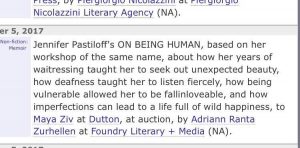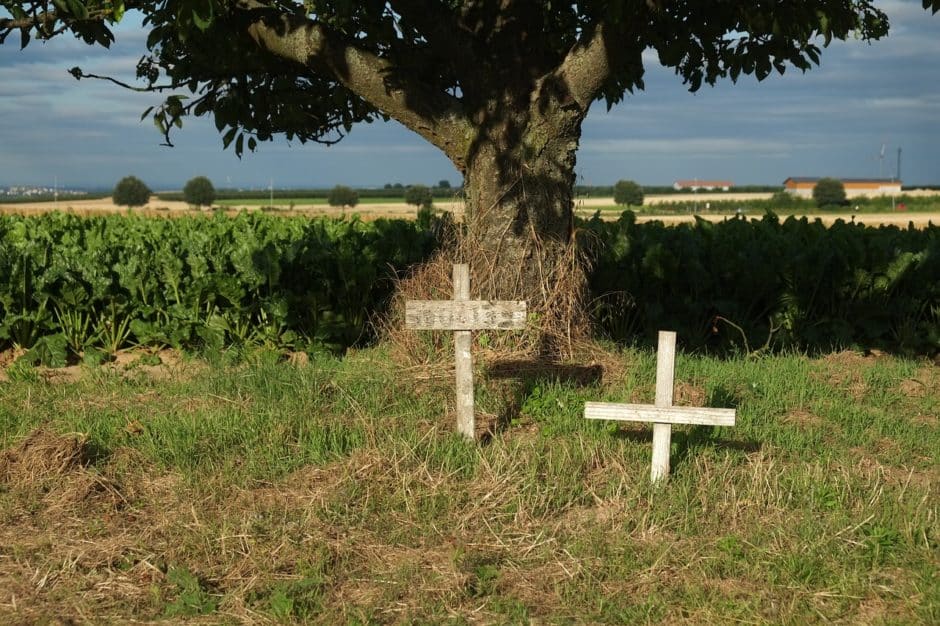By Aimee Ross
A cross has stood in that field for three years.
Three years since he smashed into me and the girls in my car that summer night. We were on our way home from dance camp.
The girls escaped the wreck with minor injuries. I barely survived.
He died.
Fifteen minutes from home. We were almost home.
Dear Zachary,
I’m writing this letter to you because I feel like I have to, even though I don’t know you and never will. I can only know my version of you, and to be honest, it’s not good.
I know you were the driver of the red Mini Cooper who ploughed recklessly into the side of my gray Saturn Aura that warm July night. I know you were only nineteen, and not one of my former students. And I know that doctors declared you “brain dead” the next day in a room near mine at Cleveland Metro Trauma Center.
The cross was first pushed into the earth less than two weeks after the accident. My mom, who drove past the site twice daily on her way to and from the hospital, was infuriated by it. She thought it was made of Bud Light boxes. I’d been past the site since then a few times, but I had never stopped. I never wanted to be in that space long enough to think.
Until now.
After the accident, visitors told me rumors about you. Even my own daughters. They knew people you partied with. They also warned me of your Facebook memorial page, but I didn’t listen.
I looked too soon.
You—the party boy with swag—were loved, and by many. They called you Zach. Throwing bangers, getting baked, and blowing smoke at the camera consumed the posted memories and fuzzy photos.
Something kept telling me to visit the scene.
And I needed closure.
So, armed with notebook and pen and ready to record the epiphany I was sure to have, I drove there alone one mid-summer afternoon. I expected to cry, feel relief, be cleansed. The trauma would finally make sense.
As I approached the busy state route’s intersection, I noticed the warning signs of road construction—at least I wouldn’t have to worry about traffic. I parked along the berm across from the site, realizing I had no intention of leaving my vehicle anyway. I would just be here, feel here.
A friend of your mother’s told me you had trouble with the law, and I know your driver’s license had been suspended at least twice before. You even spent time in a detention home. I wonder if other rumors about you and your buddies playing a very dangerous driving game to earn points for traffic violations were true.
Beyond the intersection, a cross made of two perpendicular skateboards—not beer boxes—jutted crookedly out of a grassy slope. The ground climbing from the ditch to the tilted cross was still scarred. Dry brown gashes in the earth, like my three-year-old wounds, littered the rise where energy from an inelastic collision was absorbed. The scars, evidence of an outside force. Inertia disrupted.
And then there’s your family. Good people, I heard. I know you had dinner at home with them that evening. You asked your dad for the car, the one titled to him but given to you, so you could go to a friend’s house. You were on your way when you crashed into us. I also know your family loved you. Just moments after finding out you had passed—after being asked about donating your organs—your father and sister hugged my brother. They cried, said they hoped I would “pull through.” I imagine your mother was broken in a corner, lost in a sea of tears. I know your parents—an older, more settled couple—adopted you and your sister from another country far away. Maybe they couldn’t have their own children. Now they can’t even have you.
Why did he run the stop sign? How fast was his car moving?
The most devastating thing I know about you, however, isn’t that you disregarded a stop sign or might have been speeding that night. What’s most devastating is that you were driving under the influence. The highway patrol officer who came to inform me I was the “victim of a crime” said so. They don’t know how fast you were going, but they do know that you had marijuana and benzodiazepine in your bloodstream.
And then the toxicology report. I researched. Benzodiazepine, an anti-anxiety medication, can induce everything from euphoria to a hypnotic state, just like the recreational drug marijuana. Together, the two would have produced an amplified high, as well as an amplified tranquilizer effect. He might have been so high he didn’t know what he was doing. He could have been asleep at the wheel.
Why did you do that, Zach? Why?
Did you smoke pot and do drugs so often you drove stoned all the time?
Did you forget you had family and friends who loved you, a whole life ahead of you?
Did you think you were invincible, maybe even above the law?
But none of that matters. The outcome is the same.
Three beautiful girls, teenagers on the dance team I advised, were riding with me on the way back from dance camp that evening. I couldn’t protect them from you. You could have killed them. You almost killed me. I believed my daughter, also on the team, had left ahead of us, but in fact, she was only moments behind in a different car. You could have killed her that night. The thought makes me sick. I love her, just like your parents loved you. Our worst fear as parents happened to them: you didn’t come home.
I stared at the cross, thinking about what onlookers would have witnessed that July evening. A car shooting from the darkness and crashing into another. Impact in the intersection. Crunching metal, shattering glass. A body catapulted through a car’s sunroof and against the unforgiving road, as momentum propels both vehicles over a ditch to rest less than twenty feet apart. Airbags deployed, windshields buckled, a smoking engine. Four trapped inside mangled metal. Passersby stop, phone calls are made, and moments later, the chaos to save lives ensues. The scene is flooded with light, engulfed in disembodied voices, and swarming with firemen, ambulances, and highway patrol.
Your parents must miss you desperately. I imagine they didn’t know about your regular drug use. I wonder if they were shocked, horrified maybe, to find out. I’m sure they have forgiven you by now, though—you were their only son.
It is quiet here today at this place. Peaceful, even. Bright sunshine, a gentle breeze, midsummer warmth. The perfect setting for something—anything—to offer understanding. Redemption maybe. A setting to offer forgiveness.
But I am finding it difficult to do.
I am alive, but another mother’s son never went home.
We all make mistakes and poor choices. I know this. And if you had lived through the accident, maybe you would have apologized. You probably would have been sorry, too. If you had lived through the accident, maybe you even would have changed. You probably would have stopped being reckless, too. But maybe your life ended because of how you chose to live it. Maybe change would not have been possible for you. I don’t know.
I wait.
I don’t want to hate you, Zach.And I don’t want to be so angry . . . still. I even want to try to forgive you.
Nothing happens. I don’t even cry. I slide the pen back in my purse, toss the notebook to the front passenger seat, and head home. If only the intersection had been closed three years ago. If only we had taken another way home. If only he had been sober. If only he had stopped at the intersection’s sign. Then we would not have had our path crossed. T-boned. Crushed.
But I just can’t yet.
Four lives altered forever, another life lost.
Sincerely, Aimee, the woman whose life you changed
A cross marks the spot.
Aimee Ross is a nationally award-winning educator who’s been teaching high school English at her alma mater in Loudonville, Ohio, for the past twenty-six years and an aspiring writer for as long as she can remember. Her first book, Permanent Marker: A Memoir, was just published in March 2018 (KiCam Projects). She has also had her writing published on NextAvenue.org, www.lifein10minutes.com, and www.SixHens.Com, as well as in Beauty around the World: A Cultural Encyclopedia (ABC-Clio, 2017); Scars: An Anthology (Et Alia Press, 2015); Today I Made a Difference: A Collection of Inspirational Stories from America’s Top Educators (Adams Media, 2009); and Teaching Tolerance magazine. You can find Aimee online at www.theaimeeross.com.







No Comments